Removal of PRSA board minutes from the Society’s website “flies in the face of multiple Code provisions” calling for the “free flow of information,” former board member Mary Beth West said in an email to the board.
The minutes were erased earlier this year after many years of being posted. West compiled a number of complaints aimed at the board and at the Assembly which took place Oct. 7 in Boston.
|
|
Proving her point, the Society's website “newsroom” for the conference as of 5 p.m. Oct. 9 had nothing about what happened to the seven proposals that were to be put to the Assembly. There was no physical newsroom either at the conference, a break with a longstanding tradition. Only four of the proposals were put to the Assembly.
Most controversial Assembly proposal was a bid to replace “PR” with “communications” throughout the bylaws.
Up until 2006, audio recordings and transcripts of the entire Assembly were placed in the public area of the Society’s website.
New Website Rapped; Membership Dips
The re-engineered PRSA website was rapped by West who said, “I have yet to speak to a PRSA colleague who has had any form of positive user experience” with it.
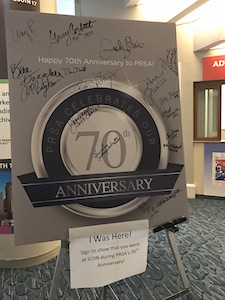 |
 |
She noted that membership had dropped to 21,201 as of March 31 vs. 21,905 at the end of 2015. That’s a loss of about $179K in revenues, she noted.
Member opposition led by West stopped bylaw proposals that would have increased board power to amend bylaws and which would have eliminated district representation on the board.
West, a member of the 2001 national board who is based in Knoxville, Tenn., recently got the board to restore minutes of the board meetings.
Pulled just before the Assembly was a proposed bylaw requiring a two-thirds majority vote of the Assembly to overturn a board proposal as opposed to the current two-thirds vote of the Assembly needed to adopt a board recommended bylaw.
Wording of the board's proposal is follows: “Allow the Board of Directors to amend bylaws. This affects article 14, sections one and two. This recommendation is the same as the one in 2016, with an added 30-day comment period prior to Board action on proposed bylaw amendments. There would also be an addition that The Board does not have the power to eliminate the Leadership Assembly and does not have the power to modify the provision in the bylaws prohibiting if from eliminating the Leadership Assembly. It would take a two-thirds majority by the Leadership Assembly delegates to overturn a recommended bylaw amendment by the board. It was further suggested to add a review of proposed amendments by the Governance Committee.
Judgment of Leadership Questioned
West wrote on her website Aug. 18 that members should “question seriously the intent and judgment of any PRSA national leadership body that would engage in a manner of behavior to expand and leverage its own power at the expense of not only democracy within the Society’s governance structure but also our organizational transparency, credibility and brand reputation, both internally and externally.”
PRSA’s ideal for ethics and professional excellence “drives the core of why people choose membership affiliation — and that ideal is far larger and further rooted than the presence of any specific leader or group of leaders,” she said.
“However, when the stewardship of PRSA’s brand identity/ideal falls into poor leadership decision-making, the impact is felt by all and poses danger to the foundation of the Society — particularly if left unchecked,” she added.
Said West: “The board is appearing to seek . . . quite unabashedly . . . a new role as the near-alpha and omega of Society bylaw creation, interpretation and enforcement, while the PRSA Assembly delegation and members at-large are left completely in the dark as to board goings-on, hidden from prying eyes that would otherwise stand equipped to demand accountability.”
Board proposals “fly in the face of multiple Code provisions” that “protect and advance the free flow of accurate and truthful information,” she said. West called the governance proposals “more than a bit alarming.”
McDonald’s Critic Is Keynote Speaker
|
|
Keynote speaker Oct. 8 was Morgan Spurlock who made a film in 2004 called “Super Size Me” charging that foods sold by McDonald’s were damaging the health of Americans including making them more obese. He ate at the chain three times a day for 30 days.
McDonald’s expanded its menu many years ago to include salads and other foods needed for a balanced diet.
Spurlock told a mostly female audience that he considers himself a storyteller and that PR people are also storytellers.
Storytellers must be able to handle criticism, he said. Look for people “who believe in you and share your vision.” Persistence is needed in pursuing a vision, he added.
Many people did not believe what he was saying about McDonald’s, he noted. A “team” of like minds was needed to help him.
Storytelling and marketing “are the same thing,” he said.
PRSA/NY Refused Assembly Coverage
Since PRSA national barred O’Dwyer reporters from the Assembly this year, we asked chapter leaders if any of the six New York chapter delegates would cover for us.
Chapter president Olga Gonzales not only refused to allow this but refused to identify the six delegates even though the chapter website promises their names.
PRSA bylaw proposal 1702, changing “PR” to “communications” in “most locations,” has touched off a furious debate on the Society’s website.
“PRSA should be advocating on behalf of public relations,” wrote Kay Barkin, MHMR, Fort Worth. The bylaw will be voted on Oct. 7 in Boston.
PRSA CCO Laura Kane, answering the critics, said only 13% of members have “PR” in their titles. “We selected the term communications because it is more encompassing than PR.”
“The intention of the bylaw,” she said, “was to address the importance of digital and social on the profession as it continues to evolve. What has traditionally been defined as PR is now being described as social media, digital communications, content management and influencer marketing among others.”
PRSA Should Promote “PR,” Says Member
“Wouldn’t it be the role of PRSA to help individuals with all these different titles to understand they are part of PR, instead of simply making PR part of communications?” Barkin asks.
Titles that Kane had mentioned in a response to her “would fit neatly under PR in the profession’s truest sense as strategies or tactics, and it seems to me PRSA should be advocating on behalf of PR,” she added.
Anthony Hicks of SRVS, Memphis, said “Completely eliminating the words PR from the bylaws of a professional assn. with PR in its official name, that is founded and grounded in PR, is a pretty significant move that seems to warrant a compromise.”
The reason for the change, wrote Kane, was “to take a forward look at where titles associated with our profession are headed.”

 Mary Beth West
Mary Beth West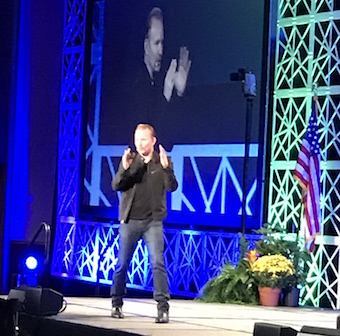 Morgan Spurlock
Morgan Spurlock
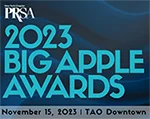 PRSA-NY today announced its five honorary co-chairs for its Big Apple Awards ceremony gala slated for TAO Downtown on Nov. 15.
PRSA-NY today announced its five honorary co-chairs for its Big Apple Awards ceremony gala slated for TAO Downtown on Nov. 15. PRSA-NY president Carmella Glover today issued a "heartfelt apology" on behalf of the chapter for her Oct. 14 message that "caused disappointment and hurt to some of our valued members."
PRSA-NY president Carmella Glover today issued a "heartfelt apology" on behalf of the chapter for her Oct. 14 message that "caused disappointment and hurt to some of our valued members."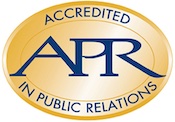 The leadership of Public Relations Society of America is backing a move to change the current “must-have” APR accreditation to “strongly preferred” as a requirement for a seat on its board of directors.
The leadership of Public Relations Society of America is backing a move to change the current “must-have” APR accreditation to “strongly preferred” as a requirement for a seat on its board of directors.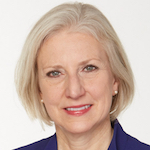 Public Relations Society of American today named Linda Thomas Brooks CEO, succeeding CFO Phil Bonaventura, interim chief since July 2019.
Public Relations Society of American today named Linda Thomas Brooks CEO, succeeding CFO Phil Bonaventura, interim chief since July 2019.


 Have a comment? Send it to
Have a comment? Send it to 
No comments have been submitted for this story yet.